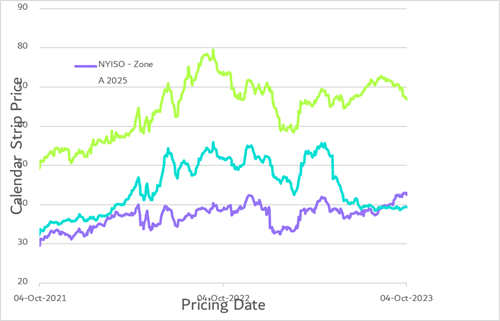Smartest Insight | Issue 137

Our weekly company round-up covers the key market and industry news in one place, so you don’t have to look any further to stay ahead.
October 05, 2023
Market Update:
For the week ending 9/29/2023 the EIA reported an injection of 86 Bcf which was 6 Bcf below consensus estimates. The report lagged both 126 Bcf year-ago build and the 103 Bcf five-year-average. The November contract is back above $3.00 and is currently up $0.20 week-over-week. The move in power has not followed the price move in Henry Hub. PJM prompt winter is off $1/MWh on the week and eastern NY and ISONE are down $5/MWh and $8/MWh. The move lower comes off the $5/BBL drop in Oil yesterday on concerns of softening demand and continued weakness in the European gas markets due to robust storage levels and unseasonably warm October temperatures. Seemingly all preliminary winter forecasts are calling for an above average winter which would be inline with historic El Nino patterns.

Regulatory Report:
Settlement in PJM Winter Storm Charges
The PJM Interconnection has reached a significant settlement agreement to address 15 complaints from power plant owners stemming from their units' underperformance during a severe December 2022 winter storm. The agreement, submitted to the Federal Energy Regulatory Commission (FERC), would reduce the nonperformance charges incurred during the storm by 31.7%, with a few exceptions.
The complaints, if left unresolved, had the potential to result in prolonged legal battles. The agreement would absolve PJM from all claims made by the involved parties, including allegations of mishandling emergency actions during the extreme weather event.
PJM enforces market rules requiring generators with capacity commitments to pay penalties into a bonus pool for failing to meet obligations during grid emergencies. During the storm, nearly 25% of PJM's generating capacity was unavailable due to freezing issues, fuel supply disruptions, and mechanical/electrical problems, leading to nearly $1.8 billion in nonperformance charges.
FERC's approval of the agreement is pending, and any significant changes must be accepted by all parties within ten business days. Additionally, a pending complaint by Energy Harbor Corporation and East Kentucky Power Cooperative's claim for relief remain unresolved.
In a separate order, FERC accepted PJM's proposal to delay its next capacity auction for the 2025/2026 delivery year until June 2024, with subsequent auctions occurring every six months. PJM intends to file capacity market reforms with FERC by October 13, including a "stop-loss provision" and reduced capacity value for gas-fired units, to mitigate future issues in the power market. Nearly half of the generators experiencing failures during the storm were gas-fired units, as reported by FERC staff and the North American Electric Reliability Corporation.
New England offshore wind projects running into trouble
Two major New England offshore wind projects have been canceled due to escalating costs, rendering their terms economically unsustainable. On October 2, Avangrid announced the termination of power purchase agreements (PPAs) for its 804-MW Park City Wind project with Connecticut utilities Eversource and United Illuminating. As part of the termination agreement, Avangrid will pay $12.9 million to Eversource and approximately $3.2 million to United Illuminating.
Similarly, on September 29, the 2,400-MW SouthCoast Wind project, proposed by Shell New Energies and Ocean Winds North America, received approval from the Massachusetts Department of Public Utilities to cancel its PPAs with Eversource, National Grid, and Unitil, in return for termination payments exceeding $60 million.
These contract terminations follow a July decision by the DPU to allow Avangrid to cancel its PPAs for another offshore wind project, the 1,232-MW Commonwealth Wind development, with the same three utilities in Massachusetts. Developers cite high inflation and escalating costs related to supply chain disruptions and the Russia-Ukraine conflict as reasons for the economic viability of these PPAs.
Avangrid emphasized the unprecedented economic challenges faced by the offshore wind industry, including record inflation, supply chain disruptions, and interest rate hikes, making the Park City Wind project unfinanceable under existing contracts.
Avangrid will resubmit the project with higher power prices in Connecticut’s next offshore wind solicitation. However, many state officials were upset by the decision to walk away from the Park City Wind contracts and they have discussed restructuring to prevent the same from happening in the future. Other NE states like Rhode Island are coming up against similar issues. With the state’s last offshore wind tender seeing only one bid.
